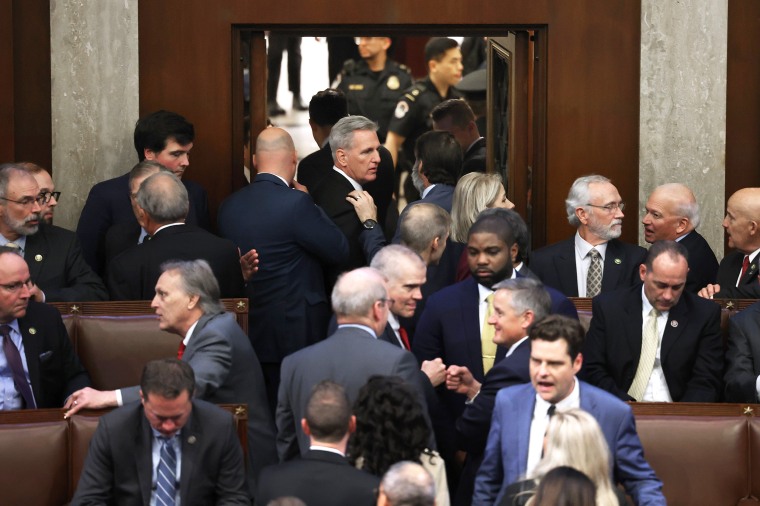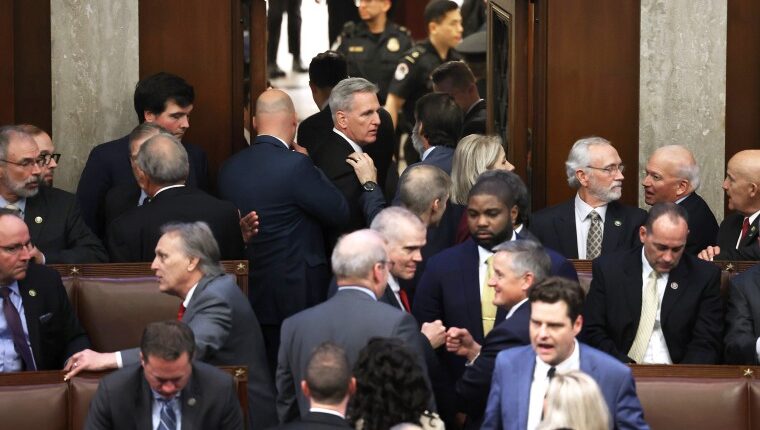WASHINGTON — Fierce Republican infighting over who should be the next speaker has paralyzed the House of Representatives, preventing lawmakers from being sworn in, delaying staff hiring and stalling the GOP’s legislative agenda.
On Thursday, the House enters its third day of the new Congress without a speaker under the new GOP majority. Until Republicans have enough votes for a candidate, all other House business remains at a standstill.
During the six speaker votes this week, 20 conservatives have stuck together to deny GOP leader Kevin McCarthy of California the 218 votes needed to win the speaker’s gavel. Because Republicans won a paper-thin majority in November, nearly all of their 222 members will need to agree on a pick for speaker.
The chaotic process moves to a seventh ballot when the House reconvenes at noon on Thursday. But while McCarthy allies and foes remained deadlocked on Wednesday, there were some real signs of progress.

After the sixth failed vote, McCarthy and his most trusted allies huddled with his most fervent opponents for more than two hours in the first-floor Capitol office of Majority Whip Tom Emmer, R-Minn. Most emerged from the meeting saying there was incremental progress.
“I crawl before I walk, I walk before I run,” a still-optimistic McCarthy told reporters after the meeting. “And I felt as though we had a very good discussion.”
During the course of that private gathering, one of the conservatives’ demands was met. The Congressional Leadership Fund, the McCarthy-aligned super PAC, and the conservative Club For Growth, which has opposed McCarthy’s bid for speaker, announced a détente: CLF would not spend money backing candidates in open-seat GOP primaries in safe Republican districts; in return, Club for Growth backed McCarthy for speaker.
McCarthy also offered a package of key concessions to his right-wing detractors, including reinstating a rule that a single House member could force a vote to oust the speaker in the middle of the Congress, according to Rep. Matt Gaetz, R-Fla., one of the leaders of the anti-McCarthy group. Earlier, McCarthy had agreed that a “motion to vacate” only could be made with support from at least five members.
“Anyone, anywhere, anytime,” Gaetz said about the power members will have to call for a vote of confidence in their speaker.
Gaetz said McCarthy has also agreed to place members of the far-right Freedom Caucus on key committees like the influential Rules Committee, which determines how a bill comes to the floor.
Those concessions could flip some of the 20 detractors to McCarthy’s column, but it’s unclear if it will get him to the magic number of 218.
“We just talked. I’m not sure any needle’s been moved,” Rep. Ralph Norman, R-S.C., one of the so-called Never Kevins who have vowed never to support McCarthy, said as he left the negotiations.
Rep. Patrick McHenry, R-N.C., a McCarthy ally and former chief deputy whip who attended the talks, characterized them as “very productive conversations” and said there appears to be “goodwill” around Republicans getting behind McCarthy.
“What we’re talking about here are the type of trade-offs that the conference can bear and that the speaker can deliver,” McHenry told reporters Wednesday night.
If he gives too much to the Freedom Caucus, McCarthy could alienate moderate allies whose support he needs to hold the fragile GOP coalition together. Some centrists scoffed at a conservative demand for subcommittee gavels for McCarthy holdouts.
“It’s a nonstarter,” said Rep. Don Bacon, R-Neb., the outgoing head of the business-friendly Main Street Caucus. “For most of us, we work hard to get promoted in these positions by being a team player.”
“To say, ‘I’m going to vote for you if you give me a subcommittee chair’? We do not like that quid pro quo.”
Frank Thorp V, Liz Brown-Kaiser, Olympia Sonnier and Kate Santaliz contributed.
Source: | This article originally belongs to Nbcnews.com










